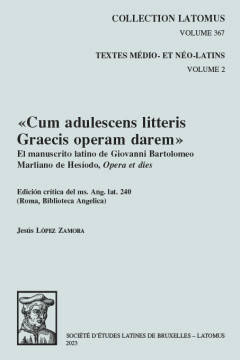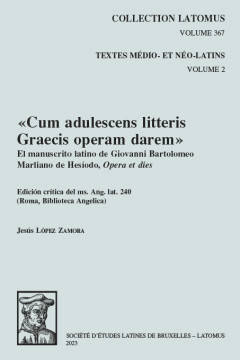
- Afhalen na 1 uur in een winkel met voorraad
- Gratis thuislevering in België vanaf € 30
- Ruim aanbod met 7 miljoen producten
- Afhalen na 1 uur in een winkel met voorraad
- Gratis thuislevering in België vanaf € 30
- Ruim aanbod met 7 miljoen producten
Zoeken
Omschrijving
The Lombard antiquarian and humanist Giovanni Bartolomeo Marliano (1488-1566) bequeathed to the convent of Sant'Agostino in Rome - now the Biblioteca Angelica - a rich collection of manuscripts, compiled during years of study of the Greco-Latin classics. Among them is a select collection of Latin translations of Greek authors that, plausibly, Marliano had used in his humanistic training. The object of this work is one of these versions: Hesiod, Opera et dies (ms. Ang. lat. 420, fols. 66r-83v). The preliminary study investigates the genesis and possible authorship of this ad uerbum translation - richly illustrated with paratextual elements that make up an authentic commentary to the work - as well as the Greek models followed in its elaboration. Finally, a critical edition of the Hesiodic translation and its copious marginal notes is offered, which exemplifies the didactic and exegetical work of Renaissance Humanism on Hesiod's poem.
Specificaties
Betrokkenen
- Auteur(s):
- Uitgeverij:
Inhoud
- Aantal bladzijden:
- 154
- Taal:
- Spaans
- Reeks:
- Reeksnummer:
- nr. 367
Eigenschappen
- Productcode (EAN):
- 9789042949102
- Verschijningsdatum:
- 27/09/2023
- Uitvoering:
- Paperback
- Formaat:
- Trade paperback (VS)
- Afmetingen:
- 160 mm x 240 mm
- Gewicht:
- 276 g

Alleen bij Standaard Boekhandel
+ 120 punten op je klantenkaart van Standaard Boekhandel
Beoordelingen
We publiceren alleen reviews die voldoen aan de voorwaarden voor reviews. Bekijk onze voorwaarden voor reviews.











